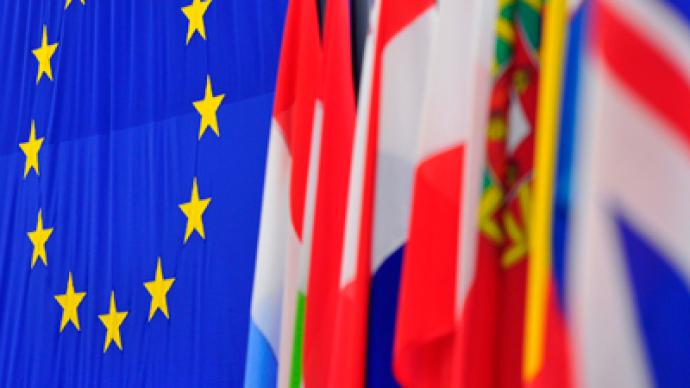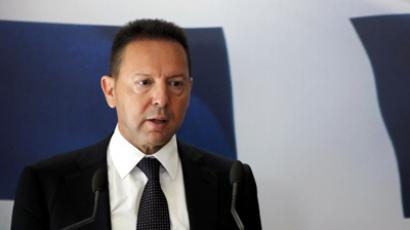‘Eurozone breakup might end EU’ - father of the euro

The EU has a future despite being in the grips of crisis, Robert Mundell, the Noble Prize winning economist told RT, adding that the struggling eurozone is key to the political union, which will rise or fall on the basis of major economic reforms.
RT: Robert Mundell, a Nobel Prize winner and – as many call you – the godfather of the Euro. It is great to have you with us today, sir.Robert Mundell: Nice to be here.RT: At the time of its inception euro was hailed as the catalyst for growth and employment in Europe. As of today, the unemployment rate in the Eurozone is 12% and also the economic prognosis is looking is pretty bad this year in terms of growth. What went wrong?RM: What wrong is the current problem of very high debts combined with high deficits. The great chalk of the recession, the global slowdown starting in 2008 and then we became victims of it. Now, it is not the creation of the euro that caused the problem so much, because before the creation of the euro came into being, countries like Italy had 120% debt GDP ratios, Greece had 110%, Belgium had at one time in the 1990s 145%. So there is a lack of fiscal discipline; the movement to the left in Europe [and] big spending on social projects that couldn’t be financed in the long run. So now Europe also has a static population, and in some cases a declining population. And so you have more aged people, more pension bills to pay and fewer people to work to repay them so it created a big problem and the shock came. RT: When you talk about debt I think there are two points to make. First of all Europe has always been plagued with debt. Greece rigged its budget deficit in order to qualify. So maybe it is not the debt but maybe that the Euro was too good or maybe too utopian for Europe?RM: What it did to the creation of the Euro when those countries came in, like Italy, before the euro interest rates were around 12%-14%, that had a devaluation premium, when they joined the euro, suddenly [they all went down] to 4%. And this encouraged countries now with low debt you can add more to it gave the wrong message because what they should have realized is that these debts now are now euro debts, they’re no longer drachma or lira debts. You can’t devalue them away, you’re stuck with this and maybe in retrospect it might have been wise for countries with high debt not to lock themselves into that fixed debt or to have had devaluation and inflation before. But nobody wanted to do that, and if they had done it they might have risked not being able to make that deadline of 1999, of getting all those countries into the Eurozone. The political moment might have been missed, and it may not have ever come up again.RT: Yes. Because when you think about it on the other hand Europe debt to GDP rates where always lower – let’s say compared to the US or Japan. Maybe what led to the crisis is not the debts, but the fact so many completely divergent economies were put together. You stitched up a Frankenstein and then injected blood into its veins.RM: When Greece entered the monetary union its GDP per capita was about a third that of Germany’s. But then Greece started to increase its level of spending, and it increased it a great deal. If they had stayed out of the Eurozone, if they were in this position now with the Drachma, of course they could devalue, and that devaluation would cut their debt down. But in the process right now if people thought that was going to happen interest rates would soar and they wouldn’t be able to do it. RT: But like you said countries like Greece, Spain, Portugal they kept loosing competitiveness once they joined the EU. That is because they had nothing to devalue too in order to make up for the loses. And that, of course, is also because of the euro. I mean they really had their hands tied with the euro. They couldn’t really stimulate their domestic economies.RM: I made a plan for the euro in, I think it was the first plan for the euro in 1969. It wasn’t called the euro. I called it the Europa. In that plan, it was different from the Delors plan in 1989, 20 years earlier, my plan kept the European currencies in until they gradually moved in and replaced national currencies – not all at once. And countries would do it one by one. They would do it when the situation was right. The first step would be, when the time is appropriate, to move to a currency board system but they still keep their currencies. If you can’t do a currency board, you can’t do a monetary union. Well that’s a lesson for countries that haven’t yet joined the Euro area, because the Czech Republic, Poland and those countries they should really – before going into that union- to see if they can get into it, and test it with the currency board system. It automatically gives you the monetary policy of being in the union but it doesn’t give up the currency yet. You still have an out in that case.Anyways, that isn’t the way the European system worked so they locked into that and got all those difficulties. Now how to… get out of it is, they’ve got to get growth going, got to get the recovery back. I think it is going to depend on a much more aggressive policy on the part of European central bank, as well as more distribution because it’s got to be redistribution in some ways help with the deficits, pulling of debts and that will involve some implicit transfers from the northern countries to the southern countries. But it will save the union. RT: I think I read in one of your interviews you’ve actually argued that if Greece were to leave the Eurozone, it will be better for Euro right now. Ok. Apart the fact that it would be disastrous for Greece, and it’s on the brink of collapse. Wouldn’t that trigger a domino effect? After Greece it would probably be Spain, Italy, Ireland…and then what’s the whole point of the European Union then?RM: There is a risk of, you could say contagion that if one country left, there might be the expectations that the other countries might leave also…RT: Should Greece leave then?RM: If one country leaves, that country is then going to have to do adjusting on its own. It is going to be much more difficult than to do it under the auspices of the Eurozone or the EU. So this would be a big penalty if a country leaves, suppose it came to be, and it could happen. If the population gets fed up with the Eurozone – they don’t trust it they don’t like it, they don’t want it – and so they get government to leave, then they are on their own. Who is going to balance the budget? They’ll have to default and then their banks might collapse and whoever else holds their debts is going to be penalized. This going to be a terrible penalty. Much more austerity in a very unfortunate way. Maybe the burden would be pushed more on people who do hold assets, richer people.RT: So you don’t think Greece should leave the Eurozone?RM: I was in Greece the end of July, I had a big press conference – 300 people were at it. And they were asking me, ‘well CitiBank just said there’s a 90% chance that Greece will have to leave the Eurozone. What do you think of that?’ And I said I think it’s a ridiculous percentage. Maybe there is some chance but not more than 25%. Later on I think Citi changed…they reduced the [percentage]. Some bad things looked like they were going to happen and they didn’t happen. For Greece to leave, to want to leave would be ridiculous. I don’t think anyone in Greece really wants to leave now, they’ve been talked out of that. Maybe 65% at least want to stay in anyway. If Greece has to default, and I think people know that Greece is already in fact defaulted in some sense, they’ve already taken partial default, they are not going to solve the problem with the huge debt level they have now. And they can’t solve the problem. So they are going to default but it is much better to default under the auspices of the troika than otherwise.RT: I want to talk to you about the broader picture that people outside the EU get. And everyone knows that the Eurozone and the EU go hand in hand. I mean that is the whole idea of the strong bloc, the strong union. From what it seems from the outside, because of the economic crisis there have been so many social problems that arose. For example, nationalism is on the rise in almost every single country of Europe right now. And people say that with euro it has brought the northern and southern parts of Europe farther apart- it only made rich countries richer like Germany and, the countries that are on the periphery, they made them even more incapable. Do you think, taking into consideration everything we’ve said, that the EU has a future?RM: Oh I think it does. I think first of all the Euro, I agree with you, the euro is a key part of the European Union now. And if the Eurozone really broke up it might be the end of that. But I don’t believe that is going to happen because they’ve got to move more rapidly and that’s the best way to do it rather than letting the crisis drag out, you’ve got to get out of the recession. You won’t get the countries solvent in respect to their deficits. All you have to do is get back to budget balance for theses counties. And you have to do that through raising revenues but not through raising taxes, and by getting the economies back to full employment. Get Europe back to full employment and all those numbers are going to change about Eurozone with [not clear] solve it. But in the process you want to make, to use the pressure here to make the political changes that prevent it from happening again. Because if you just get back to full employment you are going to go back to have all those problems again in the next recession, and I’m sure there is going to be a recession that will come in the future – so you have to solve the problem of the centralization. You got to do that quickly. The quicker you do it, the quicker the Central Bank and other forces can get to put the economy back to where it should be. You need tax cuts. I think Berlusconi is right. RT: Robert Mundell. Thank you very much for your time.














